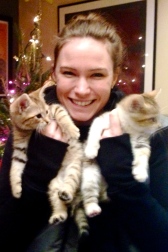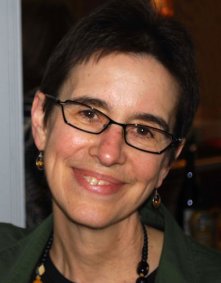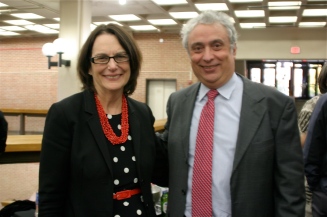Click here to read the Newsletter in “newsmag” form


Anya, pictured here with our staff of copy editors
The Fall 2013 semester has been an eventful one for the Sociology Department at the University of Maryland. Anya is returning as the editor of your newsletter, and this semester she has welcomed aboard Joe Waggle as her partner in crime. The timing couldn’t be better, because this edition of the newsletter is one of our biggest yet. With the arrival of new students, the development of new research centers, the wealth of events and lectures the semester, and the exciting work of our faculty, students, and alums, there’s a lot to cover. We hope this newsletter provides a snapshot of our department as we move into a new semester.
Many thanks go to our all of our contributors, without whom we’d have no choice but to publish 40 pages of kitten photos. In this issue, look for advice from our faculty on productivity and the creative process, a summary of Annette Lareau’s talk at the annual Rosenberg Forum, and the exciting results of a highly empirical analysis of famous sociologists and their celebrity doppelgangers. This issue also includes profiles of the incoming gradate student cohort, new staff member Gaye Bugenhagen, 2008 alum Wendy Wang, current grad student Dave Paul Strohecker, and current undergrad Victoria Marie Ortiz. Look for information about five of our department’s research centers, as well as a letter from Jeff Lucas, who is filling the new Director of Research Position.
This year, our department lost an exceptional friend, mentor and colleague with the passing of Suzanne Bianchi. The warm response to our request for contributions in her memory is evidence of the lasting impression she has left on our community. She will be greatly missed.
Warmest wishes for the New Year,
 It is almost obligatory and somewhat trite to begin this kind of message by exclaiming: This is an exciting time for our department! But indeed it is! We are in the midst of a major assessment within our unit about our future goals regarding our research, our graduate program, and our undergraduate teaching, and I expect our dialogue to produce a renewed vision for our department as we enter 2014. More details will be forthcoming.
It is almost obligatory and somewhat trite to begin this kind of message by exclaiming: This is an exciting time for our department! But indeed it is! We are in the midst of a major assessment within our unit about our future goals regarding our research, our graduate program, and our undergraduate teaching, and I expect our dialogue to produce a renewed vision for our department as we enter 2014. More details will be forthcoming.
In the meantime, I would like to highlight three recent developments. This coming Spring, we will be joined by Professor Mansoor Moaddel (Ph.D. University of Wisconsin), who studies culture, ideology, political conflict, revolution and social change. Previously at Eastern Michigan University, Professor Moaddel has a long trajectory of collaboration with the Population Studies Center and the Institute for Social Research at the University of Michigan, conducting important value surveys in Africa and the Middle East. Besides working in our department, he will be collaborating with our University’s START Center. Professor Moaddel is one of a series of successful hires we have conducted over the past year (and will be officially announcing soon).
Our graduate students and faculty have been working productively on a Critical Race Initiative. This initiative aims to bring together people within our department and the university who incorporate a substantive interest in race and/or ethnicity in their research and/or teaching. The initiative is especially interested in identifying scholars who cast a critical eye on the use of race and ethnicity sociological research and practice, and is organizing various events and seminars providing a space for substantive discussion and collaboration around relevant issues. The initiative will have its official launch with a major event to be held in our department in April 2014.
Finally, our great office staff has been strengthened by the addition of two new members. Gaye Bugenhagen is our new Director of Administrative Services. Jessica Lee is our new Administrative Assistant. We extend a very warm welcome to both. And we also are grateful for the speedy recovery and return to our office of Mini Rajan!
On a sadder note, Professor Suzanne Bianchi passed away last November 4th. Suzanne chaired our department between 2006 and 2009 and was a founding director of the Maryland Population Research Center. Throughout her career she produced outstanding research on the intersections of gender, work and family. She was a great mentor of our junior faculty and graduate students, and a very esteemed colleague within our department and the university. She will be very much missed.
 This year, the University of Maryland sociology community lost a valued colleague, a formative influence, and a beloved friend. Suzanne Bianchi changed our ideas of how American families function with her contributions to demography, feminist theory, and time use studies. Her most notable work debunked the long-held notion that mothers’ labor force participation had an adverse effect on children by demonstrating that working mothers make concessions in their leisure time and their work expectations to be able to spend more time with their children.
This year, the University of Maryland sociology community lost a valued colleague, a formative influence, and a beloved friend. Suzanne Bianchi changed our ideas of how American families function with her contributions to demography, feminist theory, and time use studies. Her most notable work debunked the long-held notion that mothers’ labor force participation had an adverse effect on children by demonstrating that working mothers make concessions in their leisure time and their work expectations to be able to spend more time with their children.
Suzanne lived her work. Before she was the Dorothy Meier Chair in Social Equities at the University of California at Los Angeles, she was a professor of sociology and a population scholar here at the University of Maryland. The department recruited her directly from the United States Census Bureau, where she was Assistant Division Chief for Social and Demographic Statistics in the Population Division. When she transitioned to UMd, she juggled her duties as a professor of sociology with her position as Founding Director of the Maryland Population Research Center, as well as President of the Population Association of America and Editor of Demography. Coupled with a prolific and highly regarded publishing history, Suzanne kept busy, but was never too busy to raise her three children with husband Mark Browning.
Suzanne passed in early November shortly after being diagnosed with pancreatic cancer. She was 61 years old. She will be dearly missed by her family, and her absence will be keenly felt by the men and women who have called her a colleague, a mentor, and a friend. We asked a few of her former collaborators and students to reflect on Suzanne’s life, her influence on their lives, and her lasting impact on the field.

Speaker Annette Lareau with department chair Patricio Korzeniewicz, enjoying the post-lecture reception.
On Friday, October 18th, Dr. Annette Lareau spoke at the Department’s Rosenberg Forum. Lareau is the Stanley I. Sheerr Term Professor in the Social Sciences at the University of Pennsylvania, and is the current president of the American Sociological Association. Her talk was entitled, “Housing, Schools, and the Maintenance of Inequality: How Upper Middle Class Parents Can Afford to be Nonchalant.” In her current work, the intellectual seed of which was planted during her tenure in the sociology department here at UMd, Lareau asks how people form neighborhood preferences when they move to a new area. In essence, she wants to know, how do people end up where they do?
Did you know that the newest employee in the sociology main office can run thirty to forty miles of hiking trails in one shot?
Shengwei Sun, a second-year doctoral student, had the opportunity to conduct an interview with Dr. Wang to learn about her academic experiences, professional trajectories, and her advice to current graduate students.
Our graduate students do some fascinating work, and this year that work has earned them some incredible recognition. We’d like to recognize them here as well. Check out how much great work our grad students are doing after the jump. Keep up the good work, grads!
The University of Maryland Sociology department produces some cutting-edge and innovative research, thanks in no small part to the collaborative work of our research groups. Whether these are returning research centers or new additions to our research community, these initiatives are producing a diverse and fascinating body of work for the social sciences here at the University of Maryland and all over the world.
The department recently created the Director of Research position to be available to assist members of the department (faculty, students, and affiliates) in their research activities. I’m filling this position this year.
 Inspiration is a fleeting thing, especially in graduate school. At any given moment, grad students are juggling class deadlines, pressures to publish, and the soul-crushing existential crisis that is the imposter syndrome. In the face of all of that, it seems damn near impossible to pound out eight thousand words critiquing the male gaze in the latest episode of Game of Thrones. And yet, every day, scholars tackle projects large and small.
Inspiration is a fleeting thing, especially in graduate school. At any given moment, grad students are juggling class deadlines, pressures to publish, and the soul-crushing existential crisis that is the imposter syndrome. In the face of all of that, it seems damn near impossible to pound out eight thousand words critiquing the male gaze in the latest episode of Game of Thrones. And yet, every day, scholars tackle projects large and small.
This semester, your editors decided to turn to the experts, our own faculty, for advice on how to get the creative juices flowing without drowning in all of the high standards and expectations of the job. Check after the jump for how some of our very own professors tackle their problems with creativity and inspiration.
Recently, UMd Alumni magazine The Shell profiled sociology doctoral candidate, rising cultural theorist, and all-around nice guy Dave Paul Strohecker and his work on tattoo culture. The article’s author, Liam Farrell, has given us permission to reprint the article here.
Victoria Marie Ortiz is a junior pursuing a double degree in psychology and sociology. The Texas native asserts that she is happy with her choice in the University of Maryland for her studies. She states, “My dad works at the Pentagon, so even though I had been in Texas all my life, I knew the DMV would still in some ways feel like home.” In this short interview, she offers how sociology impacts her and why graduate school matters for her future career plans.
Check after the jump to learn about her goals, her influences, and her advice for future sociologists.
Each year, the Department of Sociology welcomes an incoming cohort of PhD students. This year’s incoming graduate students hail from across the US and hold a wide range of research interests. Read on to learn a bit about our newest UMD sociologists!
Being inundated by social theory throughout our graduate and undergraduate careers, it is sometimes difficult for sociology students to think about theorists as anything other than vastly influential figures. They have crafted the methods and paradigms of our field, and have had an enormous impact on how we perceive our social world. But did you also know that they shine even brighter than some of our most popular celebrities? That’s not just us saying that, though; that’s science.